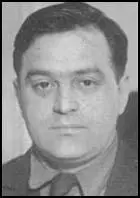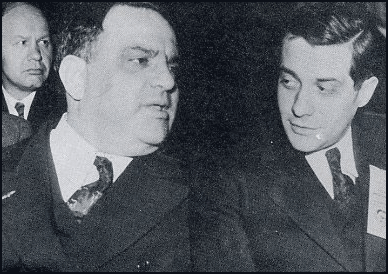Fiorello LaGuardia

Fiorello LaGuardia was born in New York City on 11th December, 1882. The family moved to Hungary in 1898. La Guardia worked at the American consulates in Budapest, Trieste and Rijeka before returning to the United States in 1906.
While working as an interpreter for the United States Immigration Service at Ellis Island, La Guardia studied law at New York University. La Guardia was admitted to the bar in 1910 but his real love was politics and in 1916 was elected to the House of Representatives as a progressive Republican. When the United States entered the First World War La Guardia joined the US Air Service and served on the Italian-Austrian front. After the Armistice La Guardia returned to Congress. An opponent of prohibition, La Guardia campaigned for women's suffrage and an end to child labour.
In 1924 Vito Marcantonio joined Fiorello La Guardia in supporting Robert La Follette, who was the presidential candidate of the Progressive Party. This resulted in La Guardia losing the Republican Party nomination. "The Democratic Party, as usual, sought to defeat him. La Guardia asked me to actively participate in that campaign, and together with a handful of our friends and neighbors in East Harlem, we conducted a successful campaign for him and for LaFollette in our congressional district." In 1932 he co-sponsored with George Norris, the Norris-La Guardia Act, which restricted the courts' power to ban strikes.

La Guardia was elected mayor of New York City in 1933. Over the next twelve years he developed a reputation as an honest and efficient administrator. A supporter of the New Deal, La Guardia expanded the city's social-welfare services and began a program of providing low-cost housing.
In 1945 La Guardia decided against seeking re-election in 1945. The following year he became director general of the United Nations Relief and Rehabilitation Administration. Fiorello La Guardia died on 20th September, 1947. His autobiography, Making of an Insurgent, was published posthumously in 1948.
Primary Sources
(1) Il Pubilo, Italian newspaper published in New York City (9th October, 1916)
For a long time the Italian soul has been misunderstood in the United States, resulting in a lack of sympathy for the vast body of Italian-American citizens. What better opportunity to create more favorable relations between the sons of the New World and the adopted children of Italian origin in the United States than to have La Guardia in Congress as an exponent of Italian psychology and tradition?
(2) Fiorello La Guardia, speech (12th November, 1918)
The awakening of the progressive spirit throughout the country means nothing else than the arousing of a united protest against conditions which have become intolerable. There is nothing about this movement that is complicated or difficult of being explained. Exploitation, the result of favored legislation, poverty, the result of the greed of monopolies, dissatisfaction, the result of privileged government, have resulted in the alliance between farmers, industrial producers, the believers in democracy, and the true lovers of America. That is all there is to it.
